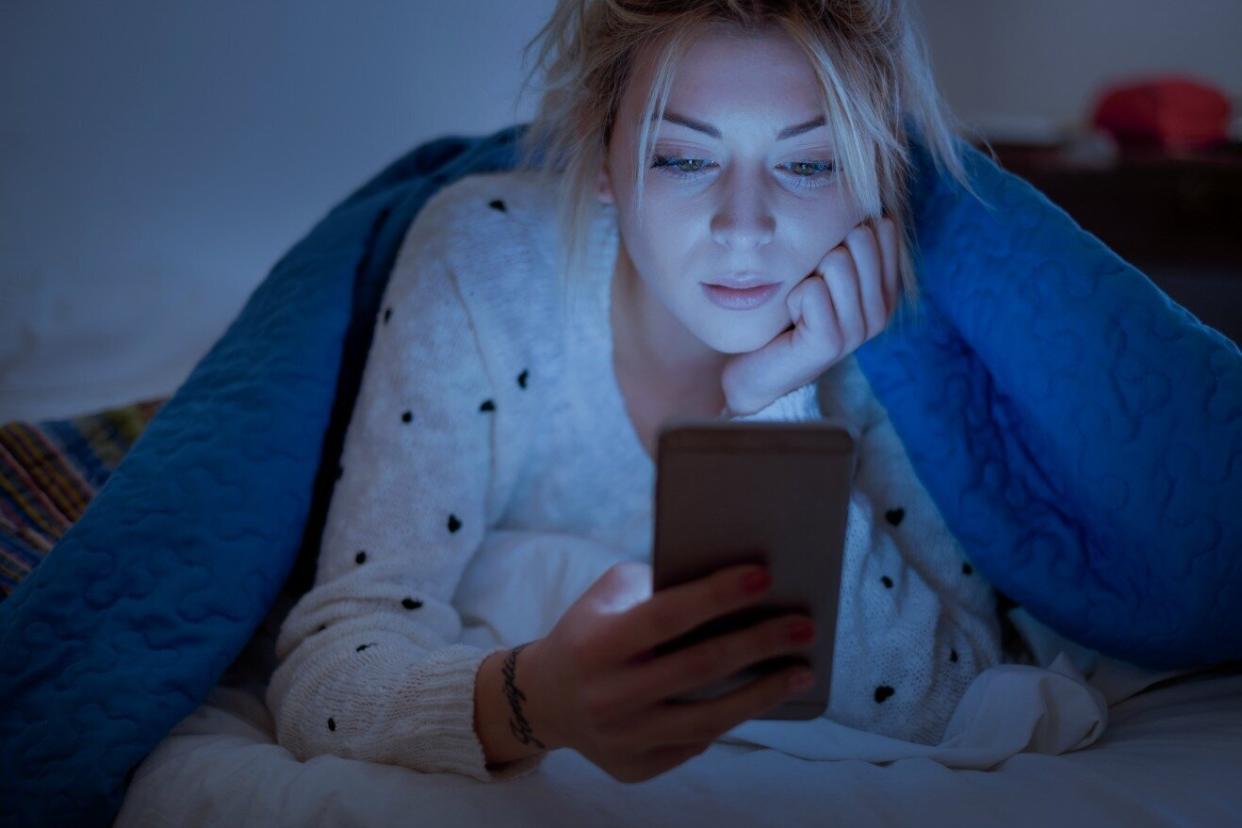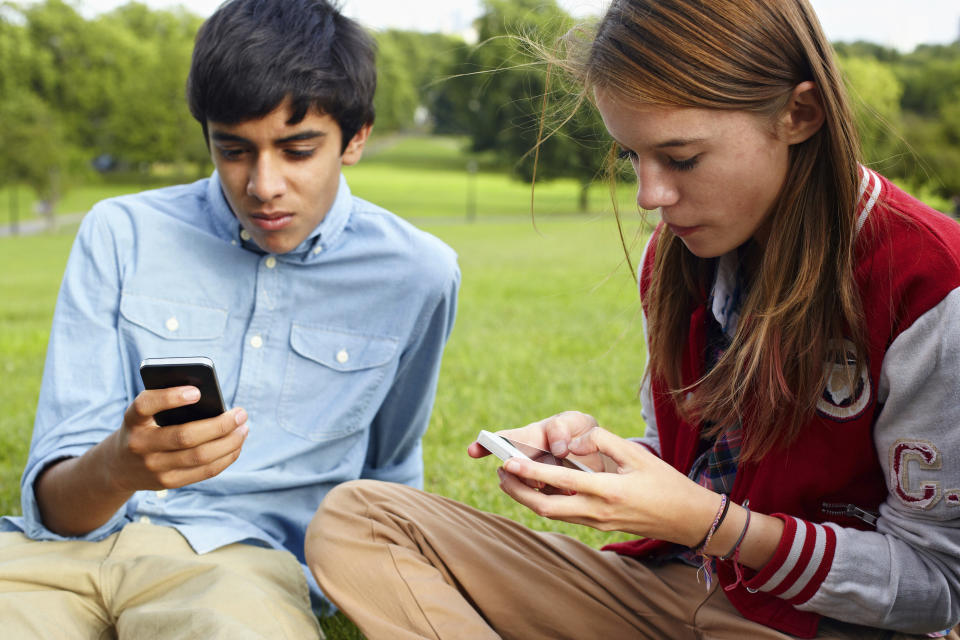The insidious addiction consuming Gen Z

Generation Z is in the throes of an addiction crisis, and their drug of choice is lurking right under our noses.
So says David Gillespie, who is waging a war against smartphones and the dangerous hold they have on our teenagers.
He describes a scenario that will be uncomfortably familiar to many parents of a teen: a usually reasonable and sweet teenager, who unleashes a terrifying fury and agitation if they’re separated from their iPhones.
Almost like an addict separated from their drug of choice, or exactly like an addict separated from their drug of choice as the case may be.
This isn’t a generation of spoilt brats, he argues, it’s a generation addicted to a substance we give them unlimited access to.
Over the past decade, teenage rates of traditional substance use and abuse have plummeted.
Aussie studies show that since 2000, teens using illicit drugs has dropped by almost 10% and the age teens first drinks has increased from around 14 years in the early 2000’s to over 16 years old in 2016.
A yearly American study which has been running since the early 1990’s, has found “a continued long-term decline in the use of many illicit substances... among the nation’s teens”.
Addiction is usually linked to mental illness, so hypothetically, less addiction should equal less mental illness, but these days it’s the opposite.
So what is it making our kids so sick if the ‘bad stuff’ is on the decline?
According to Gillespie and others, it’s a new kind of ‘bad stuff’, that hit the mainstream around the time other addictions began to decline; the iPhone and its many peers in the digital world.
A 21st century substance

According to research, highly addictive devices are making our kids at once safer, and sicker than they have ever been.
It’s not a finding out of the left field, only last month The World Health Organisation released a recommendation that children under the age of two should have no sedentary screen time at all, and children between the ages of two and four should be limited to only one hour a day. But what if the real danger comes at an older age?
In his recent book Teen Brain Gillespie, a researcher and former co-founder of a software company, makes the case that many phone applications, are specifically designed to be addictive, and we’re giving our teens unprecedented access.
“This software is specifically engineered to alter behaviour in addictive patterns,” he tells Yahoo Lifestyle. “They need us to be addicted to their software or we will not use it.”
It’s a sentiment clinical psychologist and researcher Dr Danielle Einstein backs up, saying there is no secret that app makers want us to be hooked, and the younger the better.
She says our inattention to the harm of screens means we are at the mercy of apps which have been finely tuned to milk our rewards system.
Dr Einstein is developing an educational program around the link between anxiety and smartphone use among teens.
She tells Yahoo Lifestyle there is “an epidemic of people feeling the unstoppable urge to reach for their phones to check messages, posts, emails. The lack of restraint is poisoning our culture”.
Gillespie points out that teens are particularly vulnerable to, and harmed by addiction because their brain is in its developmental stage, and any damage done can be permanent.
“There’s good solid science that says addictions developed in those ten years are likely to be with you for the rest of your life,” he says.
“It’s really important not to be exposed to overly addictive things, or potentially addictive things.”
Dr Einstein backs this up agreeing that, “the answer lies in early intervention for teenagers.”
A pokie machine in your pocket

Gillespie likens the design of apps to the well-documented effectiveness of gaming machines.
He says substances become addictive when they illicit a chemical response that fuels a desire for more.
For teenage girls, that ‘more’ is oxytocin, or the social chemical which makes us feel validated and connected as humans.
They get this every time an Instagram like comes through, for example.
For teenage boys, it’s the danger thrill which responds to their high levels of testosterone.
It’s mainly triggered through games like Fortnite, which simulates the danger hit they naturally seek.
Are we scare mongering?

Other experts don’t buy the link between rising rates of mental illness and smartphone addiction, arguing a definitive link hasn’t been established.
Dr Joanne Orlando is an analyst in digital literacy, and says smartphones haven’t been medically proven to be addictive.
“There’s no strong evidence to confirm that there is such a thing as phone addiction,” she tells Yahoo Lifestyle.
While she acknowledges we use our phones ‘way too much’, she disagrees that higher rates of mental illness can be used to prove the existence, let alone epidemic of smartphone addiction.
She says there are many factors contributing to a more mentally ill generation.
“There’s enormous amounts of pressure on our teenagers to succeed,” she says, citing parents, broader society and social media as contributing factors.
That said, she doesn’t agree that we can equate social media harm to social media addiction.
“If we say it’s just the phone I think that’s too simple,” she says.
Dr Einstein agrees, saying ‘not all smartphone use is bad or bad for mental health’, but that we need strong programs to educate and understand the potential for harm.
Dr Einstein is preparing to release a guide for parents trying to manage smartphone use.
She says ‘smart’ device use is the way forward.
What’s the solution?

Gillespie has quite dramatically suggested that schools no longer require students to learn on personalised devices.
“I wish my advice could be, ‘Throw the damn things in the bin’,” he says, although he acknowledges that is impractical and suggests strict monitoring of use at home.
Dr Einstein agrees, but admits, ‘there are benefits’.
“I believe that computers should be provided by the school and that there should be limited use in the classroom.”
Dr Orlando is of a different mind, arguing restricting technology would be teaching with tunnel vision.
“The reason our schools are here is to prepare our kids to work in the society that they’re growing up in,” she says.
“I think it’s important that technology is used strategically to help them to learn.”
Meanwhile Dr Einstein issues a dark warning to those that don’t acknowledge a brewing issue.
“Unmanaged device usage will destroy our next generation and poison our culture.”
If you are concerned about the mental health of yourself or a loved one, seek support and information by calling Lifeline on 13 11 14 , Mensline on 1300 789 978, or Kids Helpline on 1800 551 800
Got a story tip? Send it to lifestyle.tips@verizonmedia.com
Want more lifestyle and celebrity news? Follow Yahoo Lifestyle on Facebook, Twitter and Instagram.
Or sign up to our daily newsletter here.

 Yahoo Lifestyle
Yahoo Lifestyle 


